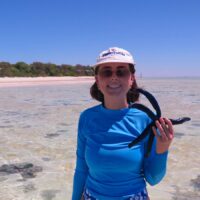Amelia Desbiens
PhD Candidate
University of Queensland

From 2005 to 2022, the main node of the ARC Centre of Excellence for Coral Reef Studies was headquartered at James Cook University in Townsville, Queensland (Australia)








PhD Candidate
University of Queensland
Amelia completed a Bachelor of Advanced Science (Hons Class I) at the University of Queensland in 2019. Her Honours research, under the supervision of Prof. Pete Mumby at the MSEL lab, focused on the development of a structural equation model to tested hypotheses concerning shark-driven trophic cascading. She has subsequently worked as a research assistant at the Australian Rivers Institute of Griffith University and The Nature Conservancy, exploring management practices of tuna fisheries and hawksbill turtle conservation in countries of the Western Pacific.
In 2020, Amelia began her PhD working on the ecology of the pervasive crown-of-thorns starfish (CoTS). Her thesis will feature both empirical studies on the interactions of juvenile CoTS with invertebrate cryptofauna in rubble habitats as well as broader-scale modelling of population dynamics and outbreak initiation mechanisms. In tandem with this experimental work, she is an ongoing contributor to a project led by Dr. Kennedy Wolfe on the role of cryptic invertebrates and invertivores in reef trophodynamics. This work began with the design and subsequent deployment of RUbble Biodiversity Samplers (RUBS) in Palau in 2019 and has now been expanded to incorporate GBR sites.
Amelia is passionate about the application of statistical methods to ecological problems in marine systems and has specific interests in trophic interactions, food web ecology and ecosystem modelling. She hopes to continue exploring these interests throughout her candidature and ongoing collaborations.
New DNA techniques are being used to understand how coral reacted to the end of the last ice age in order to better predict how they will cope with current changes to the climate. James Cook Univer
A new study on the effects of climate change in five tropical countries has found fisheries are in more trouble than agriculture, and poor people are in the most danger. Distinguished Profess
James Cook University researchers have found brightly coloured fish are becoming increasingly rare as coral declines, with the phenomenon likely to get worse in the future. Christopher Hemingson, a
Researchers working with stakeholders in the Great Barrier Reef region have come up with ideas on how groups responsible for looking after the reef can operate more effectively when the next bleaching
Abstract: As marine species adapt to climate change, their heat tolerance will likely be under strong selection. Individual variation in heat tolerance and its heritability underpin the potential fo
Abstract: The Reef Ecology Lab in KAUST’s Red Sea Research Center explores many aspects of movement ecology of marine organisms, ranging from adult migrations to intergenerational larval dispersal
Abstract: Macroalgal meadows are a prominent, yet often maligned component of the tropical seascape. Our work at Ningaloo reef in WA demonstrate that canopy forming macroalgae provide habitat for ad
Abstract: Sharks are generally perceived as strong and fearsome animals. With fossils dating back at least 420 million years, sharks are not only majestic top predators but they also outlived dinosa
Abstract: Connectivity plays a vital role in many ecosystems through its effects on fundamental ecological and evolutionary processes. Its consequences for populations and metapopulations have been
Abstract: Evolution of many eukaryotic organisms is affected by interactions with microbes. Microbial symbioses can ultimately reflect host’s diet, habitat range, and even body shape. However, how
Abstract: The past few years have seen unprecedented coral bleaching and mortality on the Great Barrier Reef (GBR) but the consequences of this on biodiversity are not yet known. This talk will expl